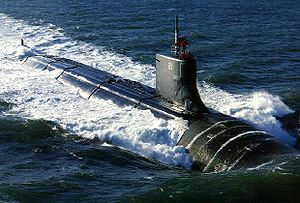
Surfaced: 8,600 tons
The Seawolf class is a class of nuclear-powered fast attack submarines (SSN) in service with the United States Navy. The class was the intended successor to the Los Angeles class. Design work began in 1983. At one time, an intended fleet of 29 submarines was to be built over a ten-year period, later reduced to twelve submarines. The end of the Cold War and budget constraints led to the cancellation in 1995 of any further additions to the fleet, leaving the Seawolf class limited to just three boats. This, in turn, led to the design of the smaller Virginia class. The Seawolf class cost about $3 billion ($3.5 billion for USS Jimmy Carter) making it the most expensive SSN submarine and second most expensive submarine ever after the French SSBN Triomphant class.
The Seawolf design was intended to combat the threat of large numbers of advanced Soviet Navy ballistic missile submarines such as the Typhoon class and attack submarines such as the Akula class in a deep ocean environment. Seawolf class hulls are constructed from HY-100 steel, which is stronger than the HY-80 steel employed in previous classes, in order to withstand water pressure at greater depths.